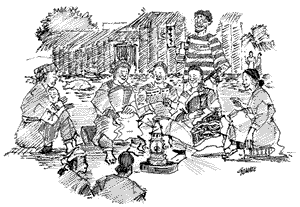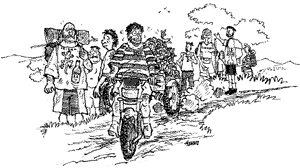|

THE OTHER THAILAND,
Part.11
David Francis, far from the bars
and aircon, finds that Asian farmers have little in common with the Range
Rover set of his native England.......
A POOR FARMER'S LOT: HARD BUT SOMETIMES HAPPY

Ali is a 25 year old Lisu woman. She is a Christian and when I first
met her, her Thai husband had left her. Her mother is 66 years old and
her Lisu husband had also left her. Both would tell people that they had
husbands, they just didn't know where! Because of their beliefs, neither
were likely to re-marry.
There are over 50,000 Lisu people living in northern Thailand. Their
roots are in Tibet and they have moved over the years down through China
to the hills of Mae Hong Son, Chiangrai and Chiangmai provinces. Many of
the elders still speak some Mandarin.
Their houses consist of straw roofs, bamboo walls and dirt floors. The
kitchens are separate, similar buildings, as are the bathrooms. Ali and
her mother make a little extra money by renting sleeping spaces to tourists.
They are paid 20b per head to provide the space, including evening meals
and breakfast. I don't know how much profit the tour firm makes!
All the cooking is done over a wood fire as there is no electricity
in this village. I asked Ali when it would be wired up and she replied
"In about 200 years".
Ali has 3 brothers and a sister. One brother is a Buddhist monk, another
a travelling Baptist preacher and the third owns a small village shop,
run by his wife. He works in a nearby town and his wages help to keep the
whole family.
Between them, the family own and farm 60 rai (20 acres) of land and
the work is mainly done by Ali and her mother. In the past Ali worked as
a children's nanny and waitress, sending money home so that her mother
could employ village people to work the land for 40b per person per day.
But due to their other commitments, village labour became hard to get so
Ali was recalled to help her mother.
Mother and daughter keep chickens and pigs - an unusual black breed
favoured by hilltribe people more for their fat than their meat, which
is red. In their village once I saw a pig slaughtered to be sold at 30b
per kilo when the market price for ordinary pork was 70b.
The fat is very thick and there is a surprisingly small amount of meat
for the size of the pig. Skin and fat is cut into small pieces and fried.
This produces an enormous amount of cooking fat which is poured into large
cans with the cooked skin and meat to be kept for another day. Even months
afterwards this makes a very tasty meal and the cans are jokingly called
"Lisu fridges".
Small margins
In their spare time, especially after church on Sunday evenings, groups
of Lisu women and girls sit in little circles round oil lamps, chatting
and joking in their delightful language, weaving brightly coloured cotton
strips into beautiful patterns to be sewn into headbands, belts, bags and
trimming for the bright Lisu costumes.
The items are sold to tourists or to the markets. Ali once made me a
wallet for my spectacles. It took her 20 hours and would have sold for
50b in the market. Deduct the cost of the cotton and there is very little
margin left!
At 66, Ali's mother works so hard she would put a strong 25 year old
man to shame. At the start of the hot season in April it was time to harvest
the ginger. Last season I helped digging it up, shaking mud off the roots
and heaping it into "very good", "good" and "third
class" for re-planting later. I hauled it to the house in a trailer
behind my motorcycle, to the total amazement of a group of farang trekkers!

The three of us amassed a harvest of over 1,000 kilos. No-one in the
village owns a pick-up, so they wait for a buyer to arrive. First on the
scene was a typical Thai 'Jack the Lad'. He would buy all the village's
ginger at 2b a kilo. It takes almost a year to grow this crop so 'Jack'
was told to come back in a week after the village made a decision. Ali's
brother and I asked about prices in Chiangmai and found the wholesale market
paid 5b a kilo and sold to retailers at 6b. The ginger went to the public
at 10b.
A week later 'Jack' returned, saying the price was now only 1b as the
market was "flooded with ginger". This was good for a laugh and
he was immediately Christened "Mr. Cartoon"! He soon left with
a small load he had conned out of a few families. The others sliced and
sun-dried their ginger - a very arduous and time consuming job resulting
in cut fingers and boredom. But they had cut out "Mr Cartoon"
and sold the crop for medical purposes at 6b a kilo!
Since meeting Ali and her hard-working family, I'm delighted to report
that - against expectations - she married a Thai trekking guide and they
are now very happy with a beautiful baby daughter. Even more unusually,
two of her cousins have married Australian friends of mine and now lead
dramatically different lives "down under".
Next month: Lost dowry, lost love and a lost life!
 David
Francis David
Francis
|